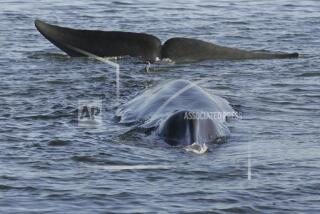Japan Pledges to End Whaling in 1988 but Ties Move to U.S. Court Case Appeal
- Share via
TOKYO — Faced with a U.S. threat to halve Japan’s fishing quota in the northern Pacific, the government pledged Friday to end Japanese commercial whaling after April, 1988.
U.S. conservation groups, seeking to save the threatened animals, greeted the announcement with skepticism, and said the Japanese could renege. U.S. officials in Japan said an end to Japanese whaling may well hinge on a case now in American courts.
The pledge to terminate Japan’s 300-year-old whaling industry came at a meeting of Prime Minister Yasuhiro Nakasone’s Cabinet on Friday. Foreign Minister Shintaro Abe told ministers he would send a letter to U.S. Secretary of Commerce Malcolm Baldrige informing him of the decision.
“We searched for other ways to solve this issue, but we couldn’t do anything about it,” Fisheries Minister Moriyoshi Sato told a news conference after the Cabinet meeting.
The U.S. government threatened last year to enforce legislation requiring a 50% cut in Japan’s fishing rights within the United States’ 200-mile economic zone if the Tokyo government did not lift its objections to a moratorium on commercial whaling.
1982 Moratorium
The moratorium was adopted by the 40-member International Whaling Commission in 1982 as a measure to preserve the world’s whale population.
The United States and Japan reached a compromise last November that allowed Japan to kill 200 sperm whales in 1986 and 1987 if it agreed to abide by the global ban in 1988.
That compromise was overturned by a U.S. federal court, which ordered the Reagan Administration to impose immediate sanctions on the Japanese. The Administration is appealing that decision.
Japan effectively reserved the right to change its position if the U.S. Appeals Court rules against the government and orders sanctions imposed.
A copy of Abe’s letter to Baldrige was released by the Commerce Department in Washington. In it, Abe said the pledge to halt commercial whaling would be kept “within five days of a decision by the Court of Appeals in favor of the United States government.”
A. Joseph LaCovey, director of public affairs for the National Oceanic and Atmospheric Administration, said, “If we lose the court case, it looks like we won’t have an agreement with the Japanese.”
‘Don’t Trust Them’
Craig Van Note of Monitor, a coalition of U.S. environmental groups, said of the Japanese pledge: “We basically don’t trust them and we don’t think they will be bound by their letter.”
While most member-states of the International Whaling Commission have ceased commercial whaling, Japan, the Soviet Union and Norway have continued to take whales, contending that the moratorium was not decided on scientific grounds.
The issue posed a threat to Japan’s Northern Pacific fishing catch, valued at more than $460 million a year.
“There is no other way to avoid a confrontation between Japan and the United States,” said an official of Japan’s Fisheries Agency, who spoke on condition he not be identified. “It is very unhappy for us, but as a result we will save the fishing conservation zone.”
Whaling in Japan started in the late 1600s and has continued as a source of meat, animal fat and oil.
However, whale meat became an expensive delicacy when catch quotas were set by the International Whaling Commission.
In 1962, Japanese whalers harvested 218,000 metric tons of whale meat, but the total dropped to less than 20,000 metric tons last year.
“We knew it was coming, but it is impossible for us to say ‘OK’ or ‘all right.’ It’s not that simple,” Motofumi Inagaki, president of Japan Joint Whaling Co. Ltd., said at a news conference.
More to Read
Sign up for Essential California
The most important California stories and recommendations in your inbox every morning.
You may occasionally receive promotional content from the Los Angeles Times.













